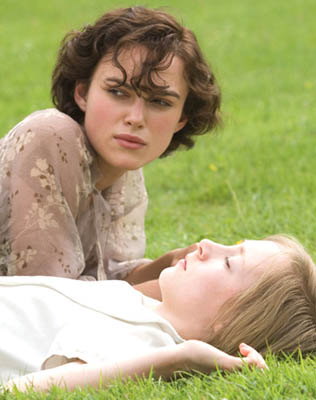Atonement
Keira Knightley, James McAvoy, and Saoirse Ronan star in a film written by Christopher Hampton, based on the novel by Ian McEwan, and directed by Joe Wright.

Good books can be a blessing and a curse; a sweet killer of a combo for cinema. Films need stories to tell and rich characters to people them with, and often the best writer for the job is a novelist rather than a screenwriter saddled with screenwriting thoughts and formulae. Bringing that literary vision to the screen, though, can be a tricky task, only increasing with the strength of the source. Fans of Ian McEwan’s novel Atonement harbor reasonable skepticism about what the screen might do to the powerful novel about the wages of love, war, an adolescent’s twisting of fate, and the manipulations of writing and the creative process.
Director Joe Wright-responsible for treating Jane Austen well in 2005’s Pride and Prejudice-manages an admirable feat with his screen version of the McEwan novel, capturing its sweep and heart and sense of destiny’s chill. With the help of Christopher (Dangerous Liaisons) Hampton’s sharp, telegraphic script, Wright mainly does the right thing by paying heed to the tone and theme of the book, while playing up the innate cinematic aspects of sight and sound to a hypnotic degree.
Sonically, one early leitmotif-and a tipoff to the future plot machinations-is the percolating sound of a typewriter, signifying the neurotic make-believe world of 13-year-old Briony Tallis (Saoirse Ronan). Her active imagination and naivete combine to spell trouble, meddling in a romantic affair between her sister (Keira Knightley) and a servant’s son (James McAvoy). The landscape turns sharply, in the film and in the narrative, from the relatively innocent turf of British affluence to the gritty reality of World War II (conveyed through a dazzlingly roaming long take of the surreal battlefield at Dunkirk, amid the grim pageantry of human suffering and dread).
Overall, Wright wisely draws on the unique expressive language of cinema to get to the heart of McEwan’s tale. It is basically a grand rumination on the delirium of love and war, as well as on the sanctioned power for fiction to manipulate and spin truth-with permission from seekers of good, inspiring novels and films everywhere. Here’s a rare case where both mediums win.
For showtimes, check the Independent‘s movie listings, here.



